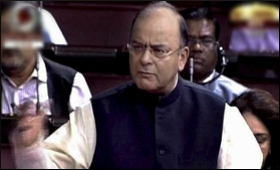|

|
Interest rates will fall in coming years: FM
|
|

|
|
| Top Stories |
 |
|
|
|
SME Times News Bureau | 13 Aug, 2015
The government expects the Reserve Bank of India (RBI) to cut interest rates further in the coming years in view of the falling of both fiscal deficit and inflationary pressures, parliament was told on Wednesday.
"With fiscal deficit coming down, and easing of inflationary pressure, it is expected that interest rates would be falling in years to come," Finance Minister Arun Jaitley said tabling the government's Medium-Term Expenditure Framework Statement in the Rajya Sabha.
Jaitley, in his first full budget in February, had extended the target deadline for controlling fiscal deficit to three percent, as insistence on a timetable would harm growth prospects. The targets for the next three years have been set at 3.9 percent for 2015-16, 3.5 percent for 2016-17, and 3 percent for 2017-18.
At its third bi-monthy monetary policy review of this fiscal last week, RBI Governor Raghuram Rajan maintained the repo rate, at which it lends to commercial banks, at 7.25 percent, after having cut the short-term lending rate thrice thus far in this year.
Jaitley told the Rajya Sabha that "fiscal consolidation strategy of the government hinges on reclaiming high growth in gross tax revenues achieved in the past. This is also essential for creating space for financing programmes of the government."
He said wholesale inflation averaged (-)2.4 percent during April-June 2015. The consumer price-indexed (CPI), or retail, inflation, declined to 6 percent in 2014-15 from 9.5 percent in 2013-14 and averaged 5.1 percent in April-June 2015.
Responding to questions on the Goods and Services Tax Bill introduced amid a ruckus in the house on Tuesday, Jaitley said: "The amended Bill, not as prepared by the government but as prepared by the Select Committee, is already before the Rajya Sabha."
Technically it did not need the introduction because the select committee directly reports to the house, so its a formal introduction and the select committee prepares the amended Bill, he added.
At the post-lunch session of the Rajya Sabha, Deputy Chairman P.J.Kurien tried to take up the GST Bill. However, as ruckus continued, the house was adjourned for the day.
Since parliament convened for its monsoon session last month, house proceedings have been repeatedly disrupted over issues like the Lalit Modi controversy and the admission and recruitment scam Vyapam in Madhya Pradesh.
The GST seeks to create a single Indian market by subsuming most indirect tax levies of the central and state governments, such as excise duty, service tax and value-added tax to facilitate tax compliance, and curb inflation through better supply chains.
But securing legal sanction for GST is proving a lengthy process, given the Bharatiya Janata Party's lower strength in the upper house.
Being a constitution amendment bill, it needs passage in parliament with two-thirds majority, following which at least 15 state legislatures have to ratify it, before it is sent to the president for his assent.
The opposition is mainly opposed to the proposal for one percent additional tax on goods travelling from one state to another, as it is felt it would not only push up prices, but also have a cascading effect.
The central government has set the target to reform India's indirect tax regime from April next year. It had earlier proposed 100 percent compensation to states for the first three years.
|
|
|
| |
|
|
|
|
|
|
|
Cut rate
suresh | Mon Aug 24 10:59:18 2015
This is the change to our economy as per the FM declare... so we can expect that our inflation will be reduce certain percentage

|
|
|
|
|
|
|
| |
| Customs Exchange Rates |
| Currency |
Import |
Export |
US Dollar
|
66.20
|
64.50 |
UK Pound
|
87.50
|
84.65 |
Euro
|
78.25
|
75.65 |
| Japanese
Yen |
58.85 |
56.85 |
| As on 13 Aug, 2022 |
|
|
| Daily Poll |
 |
 |
| PM Modi's recent US visit to redefine India-US bilateral relations |
|
|
|
|
|
| Commented Stories |
 |
|
|
|
|
|
| |
|